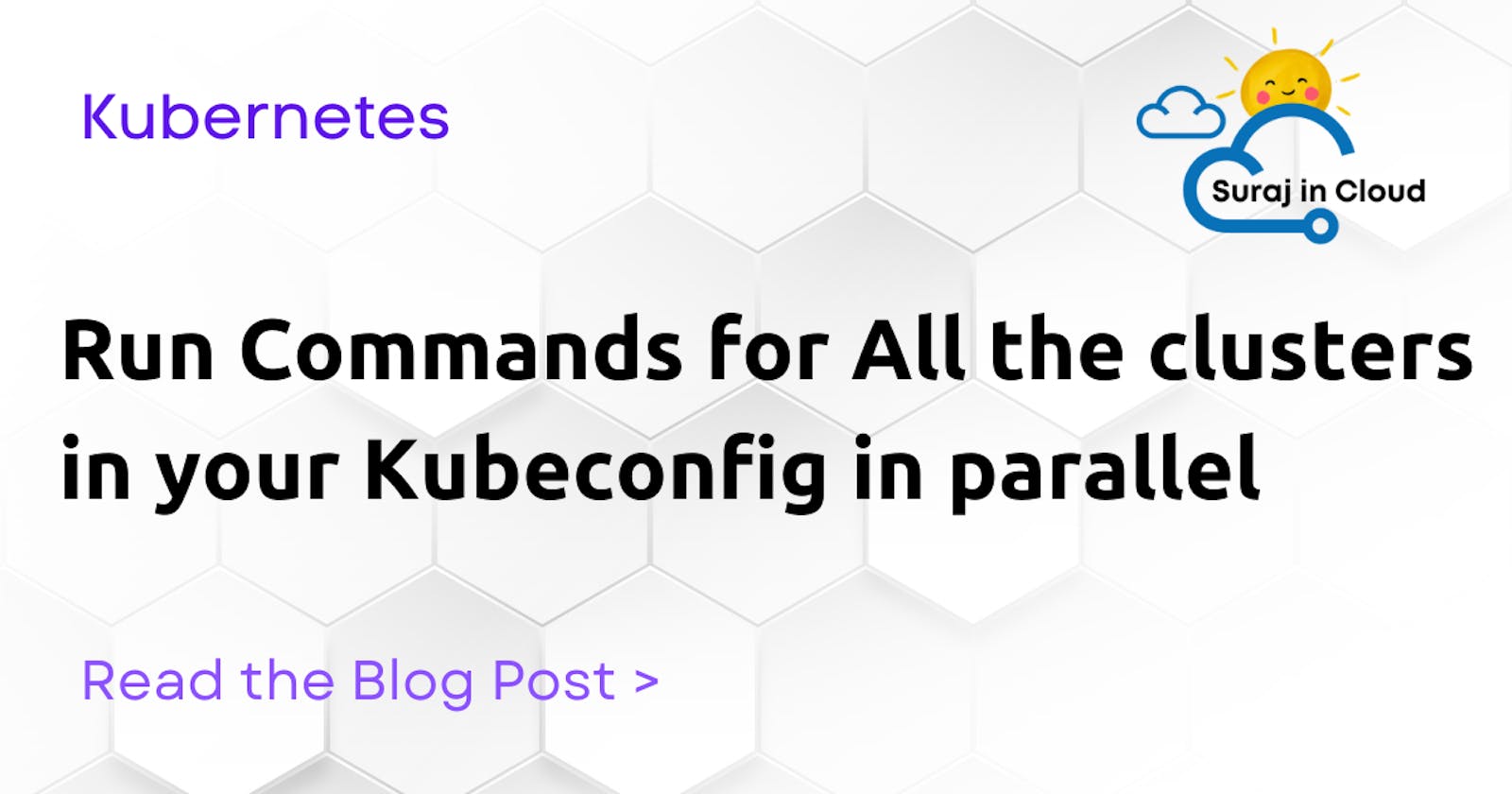Table of contents
Have you ever wondered about running kubectl commands in parallel for some of your clusters? You must have written custom shell scripts or Golang scripts to do so.
Fortunately, a tool to run commands in parallel now exists, Thanks to Ahmet Alp Balkan 🙏
Check out the GitHub repo, and don’t forget to ⭐️ the repo :)
kubectl-foreach Is a tool that allows users to run a kubectl command in one or more contexts (clusters) in parallel. This can be very useful when you need to perform an action on all of the resources in given contexts/clusters, such as gathering information, scaling them up or down, rolling out an update, or applying a configuration change.
Installing kubectl-foreach
Download the binary from the release pages of the project based on your Operating system and architecture.
Install using the Krew kubectl plugin manager
kubectl krew install foreach
- Build from scratch
go install github.com/ahmetb/kubectl-foreach@latest
Let's try it out
Check versions on all the clusters at once
kubectl foreach -- version
Basically, whatever you write
--will be your ARGS forkubectlcommands
It will now show you the following prompt,
Will run command in context(s):
- civo-1
- civo-2
- docker-desktop
Continue? [Y/n]:
Once you type Yyou will see the equivalent kubectl version output for all the clusters,
Continue? [Y/n]: Y
docker-desktop | WARNING: This version information is deprecated and will be replaced with the output from kubectl version --short. Use --output=yaml|json to get the full version.
docker-desktop | Client Version: version.Info{Major:"1", Minor:"25", GitVersion:"v1.25.2", GitCommit:"5835544ca568b757a8ecae5c153f317e5736700e", GitTreeState:"clean", BuildDate:"2022-09-21T14:33:49Z", GoVersion:"go1.19.1", Compiler:"gc", Platform:"darwin/arm64"}
docker-desktop | Kustomize Version: v4.5.7
docker-desktop | Server Version: version.Info{Major:"1", Minor:"24", GitVersion:"v1.24.0", GitCommit:"4ce5a8954017644c5420bae81d72b09b735c21f0", GitTreeState:"clean", BuildDate:"2022-05-03T13:38:19Z", GoVersion:"go1.18.1", Compiler:"gc", Platform:"linux/arm64"}
civo-2 | Client Version: version.Info{Major:"1", Minor:"25", GitVersion:"v1.25.2", GitCommit:"5835544ca568b757a8ecae5c153f317e5736700e", GitTreeState:"clean", BuildDate:"2022-09-21T14:33:49Z", GoVersion:"go1.19.1", Compiler:"gc", Platform:"darwin/arm64"}
civo-2 | Kustomize Version: v4.5.7
civo-2 | Server Version: version.Info{Major:"1", Minor:"23", GitVersion:"v1.23.6+k3s1", GitCommit:"418c3fa858b69b12b9cefbcff0526f666a6236b9", GitTreeState:"clean", BuildDate:"2022-04-28T22:16:18Z", GoVersion:"go1.17.5", Compiler:"gc", Platform:"linux/amd64"}
civo-2 | WARNING: This version information is deprecated and will be replaced with the output from kubectl version --short. Use --output=yaml|json to get the full version.
civo-1 | Client Version: version.Info{Major:"1", Minor:"25", GitVersion:"v1.25.2", GitCommit:"5835544ca568b757a8ecae5c153f317e5736700e", GitTreeState:"clean", BuildDate:"2022-09-21T14:33:49Z", GoVersion:"go1.19.1", Compiler:"gc", Platform:"darwin/arm64"}
civo-1 | Kustomize Version: v4.5.7
civo-1 | Server Version: version.Info{Major:"1", Minor:"23", GitVersion:"v1.23.6+k3s1", GitCommit:"418c3fa858b69b12b9cefbcff0526f666a6236b9", GitTreeState:"clean", BuildDate:"2022-04-28T22:16:18Z", GoVersion: civo-2 | WARNING: version difference between client (1.25) and server (1.23) exceeds the supported minor version skew of +/-1
"go1.17.5", Compiler:"gc", Platform:"linux/amd64"}
civo-1 | WARNING: This version information is deprecated and will be replaced with the output from kubectl version --short. Use --output=yaml|json to get the full version.
civo-1 | WARNING: version difference between client (1.25) and server (1.23) exceeds the supported minor version skew of +/-1
Note: you can disable the prompt by passing the -q flag, you can also set the environment variable KUBECTL_FOREACH_DISABLE_PROMPTS=true to true so that the command won't prompt again
- the previous command showed output from
docker-desktop,civo-1,civo-2What if I only want to see the outputs of civo clusters?
For that, you can supply a regex of your choice, for example,
$ kubectl foreach /civo/ -- get ns
Will run command in context(s):
- civo-1
- civo-2
civo-1 | NAME STATUS AGE
civo-1 | default Active 44m
civo-1 | kube-system Active 44m
civo-1 | kube-public Active 44m
civo-1 | kube-node-lease Active 44m
civo-2 | NAME STATUS AGE
civo-2 | kube-system Active 34m
civo-2 | default Active 34m
civo-2 | kube-public Active 34m
civo-2 | kube-node-lease Active 34m
I hope you learned something new from this blog post. Click here to learn about me and how you can support my work, Thank you.

